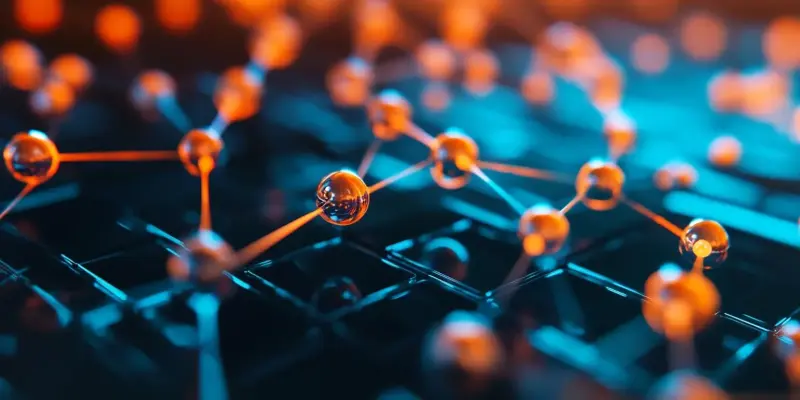Imagine a world where data storage is both highly efficient and significantly more sustainable than current technologies. Researchers at the Chalker Lab at Flinders University have developed a revolutionary polymer that can store data as tiny indents, presenting a compelling alternative to traditional hard disk drives. This innovation, led by Professor Justin Chalker and his team of researchers, including Abigail Mann, Samuel Tonkin, Dr. Christopher Gibson, and Dr. Pankaj Sharma, could transform the data storage landscape, providing a low-cost and green solution to the growing demands of our digital age.
Innovation in Data Storage
High-Density Data Storage
The research team at Chalker Lab has created a unique, low-cost polymer capable of storing data in exceptionally small indents. This breakthrough method could achieve higher data storage densities compared to conventional hard disk drives, offering immense potential for applications in modern computing. Composed primarily of sulfur and dicyclopentadiene, the material’s ability to be reused multiple times without degradation makes it particularly promising. The polymer’s physical and chemical properties enable it to encode and erase data efficiently using short bursts of heat.
The researchers employed advanced tools such as an atomic force microscope and a scanning probe instrument to demonstrate that their polymer can write, read, and erase data repeatedly without any loss of structural integrity. Abigail Mann, the study’s first author, emphasized the potential for this method to drastically reduce costs and environmental impacts. Compared to traditional data storage solutions, this low-energy, high-density technique could revolutionize how we store and manage information. The use of renewable polysulfides signifies a significant leap towards more sustainable data storage initiatives.
Erasable and Reusable Polymer
One of the most remarkable aspects of this novel polymer is its ability to have its stored information erased swiftly through short bursts of heat. Traditional data storage technologies such as hard disk drives, solid-state drives, and flash memory typically do not offer the same ease of reusability. This feature not only enhances the polymer’s sustainability but also positions it as a viable and efficient alternative for current data storage needs. The polymer’s structure facilitates rapid data erasure and reorganization, making it an attractive choice for environments requiring frequent data manipulation.
Researchers highlighted that this innovation addresses significant challenges faced by prior technologies explored by companies such as IBM, LG Electronics, and Intel. Issues related to energy consumption, cost, and material complexities have often hindered advancements in mechanical data storage. The new polymer’s ability to store information mechanically and erase it through thermal activation offers a simplified and cost-effective solution. This leap in data storage technology is poised to meet the increasing demands for high-density storage and frequent data rewriting, marking a significant advancement towards modern computing needs.
Advancing Sustainable Technology
Environmental and Cost Benefits
The commitment to sustainability and efficiency underscores the importance of this research. By using renewable polysulfides, the team at Chalker Lab has created a polymer that aligns with the growing need for environmentally friendly technology. Storage devices traditionally involve substantial energy consumption and generate considerable electronic waste. However, this innovative material promises to mitigate these issues by lowering energy usage and reducing environmental impacts. The potential for reduced costs also makes this polymer an attractive option for widespread adoption.
The strategic composition of sulfur and dicyclopentadiene in the polymer has several additional benefits. These materials are relatively inexpensive and abundant, contributing to the low production cost of the polymer. This affordability, combined with the material’s high storage density and reusability, presents a viable solution to the escalating demand for data storage in various sectors. The environmentally conscious design of this polymer is poised to benefit industries and consumers alike, offering a sustainable alternative with broad applicability.
Broader Implications and Future Applications
The research findings, published in the journal Advanced Science, highlight the substantial promise of sulfur and dicyclopentadiene polymers in advancing data storage technology. This breakthrough, backed by financial support from the Australian Research Council, received pivotal technical assistance from Flinders Microscopy and Microanalysis, alongside Adelaide Microscopy, and the Australian National Fabrication Facility. The research community and technology industry have shown considerable interest in these findings, recognizing the polymer’s potential to redefine data storage methodologies.
Looking ahead, the implications of this innovation extend beyond immediate applications. As data storage demands continue to rise, this polymer could be instrumental in developing new technologies that focus on sustainability and efficiency. Its unique properties make it suitable for use in various fields, including consumer electronics, cloud storage solutions, and large-scale data centers. By offering a high-density, reusable, and environmentally friendly option, this polymer addresses critical challenges confronting the tech industry, making it a promising candidate for future developments in data storage.
Conclusion
Imagine a world where data storage is not only highly efficient but also far more sustainable than current technologies. The innovative minds at the Chalker Lab at Flinders University have created a groundbreaking polymer that stores data as minuscule indents. This cutting-edge development offers a compelling alternative to the conventional hard disk drives we use today. Spearheaded by Professor Justin Chalker, alongside his team of ingenious researchers— including Abigail Mann, Samuel Tonkin, Dr. Christopher Gibson, and Dr. Pankaj Sharma— this breakthrough has the potential to revolutionize the data storage industry. By providing an affordable and environmentally friendly solution, it addresses the soaring demands of our digital age. The new polymer represents a significant step forward in data storage technology, embodying a future where our digital footprint is lighter, and our data storage means are less burdensome on the planet. With this discovery, the way we store and manage data could transform, fostering a greener and more efficient technological landscape.

